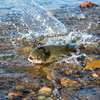
|
Kugluktuk, Nunavut, Canada

Nunatsiaq News /
Nunatsiaq News /
September 24, 2020
When Arctic fish are too hot, they can get lethargic, slow down, and possibly turn back during their migration to seek cooler water. When the water gets really warm they can even lose their ability to stay upright.
Read article
on Nunatsiaq News
|

|
Kokemäki, Satakunta, Finland
 Yle Uutiset
Yle Uutiset /
September 27, 2020
An exceptionally warm air current from the southeast has kept days and nights unseasonably mild in southern and central Finland since last week. Meanwhile the north of the country has been shivering with rain and temperatures in the single digits. The highest reading in decades was recorded in Kokemäki, southwest Finland.
Read article
on Yle Uutiset
|

|
Portland, Maine, United States

Matt Byrne /
Press Herald /
September 27, 2020
Exterminators are fielding more calls about rodent activity. Rat-related calls are up 20 percent from last year; include mice and calls are up 57 percent.
Read article
on Press Herald
|

|
Yakutsk, Sakha, Russia
 Siberian Times
Siberian Times /
September 25, 2020
The lengthy wildfire season follows a record-hot Arctic summer. People living in Yakutsk are waking up to heavy smog brought from the wildfires raging to the west, east and north; struggling to breathe and with head, eye and throat aches.
Read article
on Siberian Times
|

|
Whitehorse, Yukon, Canada

Mike Rudyk /
CBC /
September 22, 2020
The Yukon First Nations Education Directorate gave away 30,000 pounds of free fish as part of its nutritional program in Whitehorse this week. People were particularly happy to receive the donation because salmon are well below the historical average this year.
Read article
on CBC
|

|
село Гыда, Тазовский район, Khanty-Mansi Autonomous Okrug, Russia
 Siberia Times
Siberia Times /
September 17, 2020
A 200 metres wide thermocirque is discovered only weeks after scientists find funnel in the Yamal peninsula, caused by build up of methane.
Read article
on Siberia Times
|

|
Ryrkaypiy, Chukotka, Russia
 Siberia Times
Siberia Times /
September 14, 2020
The Bear Patrol in is on high alert as predators are gathering by a walrus rookery. At least nine polar bears were noticed by residents of Ryrkaipiy, a village in the easternmost region of Chukotka.
Read article
on Siberia Times
|

|
Anchorage, Alaska, United States

Teagon Hanlon /
Alaska Public Media /
September 26, 2020
The repeated run-ins with the bear were part of the reason that one children's camp decided to move out of Russian Jack to another park.
Read article
on Alaska Public Media
|
The Northern Climate Observer is published by the
Center for Climate and Health. We track news coverage from across the circumpolar north and provide readers with a curated roundup of climate change related events. Thank you for reading our newsletter and for paying attention to our changing world.
Please forward this newsletter or share it on social media. Join the
LEO Network to share your own stories of environmental change.